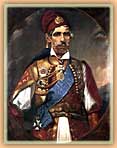 |

In November 1857, only a few months after the ending of the British-French Occupation, the prime minister D. Voulgaris resigned in protest against royal intervention in government work. From then until the dethronement of Otto (October 1862) a series of court governments were in place. The king himself played a leading role in their composition. Thus, in November 1857 he appointed A. Miaoulis, who had been until then his admiral, prime minister. He kept this position until the movement against Otto gained strength in May 1862, while from the beginning of that year his duties were assigned to A. Kountouriotis because of his grave illness. It is noteworthy that the government of Miaoulis won the elections held in 1859 and the winter of 1860-1861 thanks to royal support and the undisguised intervention of the crown in the electoral procedure. The last prime minister of Otto's kingship was Gennaios Kolokotronis, adjutant to Otto for more than two decades. The government of Kolokoktronis was formed in May 1862 and was maintained until October, when Otto was forced to leave the country because of the revolts that had broken out in Athens and many other districts. In the few years between the period of the British-French Occupation (1854-1857), a period during which Otto was as popular as ever, and the abolition of his reign on the morning of 11th October 1862, the political life of the country experienced a significant change: the end of the traditional political world and the gradual formation of a new generation of politicians composed in the framework of the political activity that took place during the movement against Otto (1859-1862).
|
 |